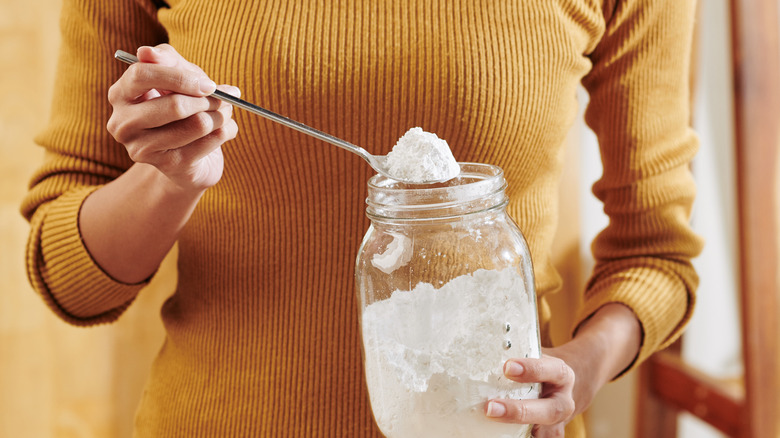Can You Use Baking Soda To Treat Your UTI?
If you have a urinary tract infection (UTI), you might wonder how safe it is to use baking soda as a treatment option. UTIs are common bacterial infections that affect millions of people worldwide each year. They occur when bacteria enter the urinary tract, which includes the bladder, kidney, urethra, and ureters, says the Mayo Clinic. The bacteria then multiply, causing symptoms such as pain, burning during urination, and frequent urination. The first line of treatment for a UTI is with antibiotics prescribed by your doctor. However, while antibiotics are the primary treatment for UTIs, some people believe that baking soda can also help treat UTIs and prevent the growth of bacteria. Baking soda is a white crystalline powder often used for baking. It has alkaline properties that can neutralize acid in the body, making it a popular home remedy for heartburn and indigestion, says Healthline.
However, while ingesting baking soda may help alleviate some UTI symptoms, it is not a recommended treatment for the infection. Indeed, while this home remedy is frequently promoted as a solution for UTIs, there is no scientific research to validate its effectiveness for this purpose, according to Medical News Today. Baking soda can also have side effects and should not be used as a substitute for medical treatment. If you're still unsure if you should use baking soda as a natural remedy for UTIs, continue reading as we explain further.
Why baking soda isn't the best solution
Baking soda has alkaline properties that can neutralize acid. When an acidic substance is added to baking soda, a chemical reaction occurs that releases carbon dioxide gas, explains the American Chemical Society. However, little scientific evidence supports the use of baking soda as an effective remedy for UTIs. Rather, there's more evidence of the many side effects that come with ingesting baking soda. Consuming in large quantities may increase the risk of a heart attack — baking soda contains high sodium levels, which can contribute to hypertension or high blood pressure, says Medical News Today. In addition, baking soda can also interact with other medications, including over-the-counter and prescription drugs, says Drugs.com.
Consuming baking soda can also lead to dehydration, as the body attempts to balance the body's salt content by increasing the amount of fluid in the intestine. This can cause nausea and diarrhea, which further causes the body to lose fluids more rapidly than it can replace them. Dehydration can cause symptoms such as dizziness, dry mouth, and fatigue. Finally, ingesting baking soda can lead to other potential side effects, especially in people with kidney disease, according to Drugs.com. They include nausea, vomiting, stomach pain, headache, loss of appetite, increased thirst, muscle spasms, weakness, and seizures.
Other ways to treat a UTI
While baking soda may not be an effective treatment for UTIs, other natural remedies may help to prevent or alleviate symptoms and promote healing. Cranberry juice is another well-known natural remedy for urinary tract infections (UTIs). Research suggests that cranberries contain compounds called proanthocyanidins, which can help prevent bacteria from sticking to the bladder walls and causing an infection, per a 2009 study (via Science News). This claim is reiterated in another 2023 review published by Cochrane Reviews which concludes that consuming cranberry juice or taking cranberry supplements may help to reduce the frequency of UTIs, especially in women. Drinking plenty of water and other fluids can help to flush bacteria out of the urinary tract and dilute urine, says the Mayo Clinic.
That being said, using natural remedies without medical supervision can be risky and lead to other serious health problems. These remedies may not work for everyone, so it's best not to use them as a substitute for medical treatment. If you suspect you have a UTI, discuss your options with your doctor before using alternative remedies.
Generally speaking, antibiotics are the primary treatment for urinary tract infections (UTIs). Your doctor usually prescribes antibiotics after a urine sample has been taken. Factors that determine the type of antibiotic prescribed for your UTI include your medical history and the specific bacteria causing the infection (which can be identified after the urine test). Commonly prescribed antibiotics for UTIs include trimethoprim-sulfamethoxazole and nitrofurantoin, per the Mayo Clinic.



